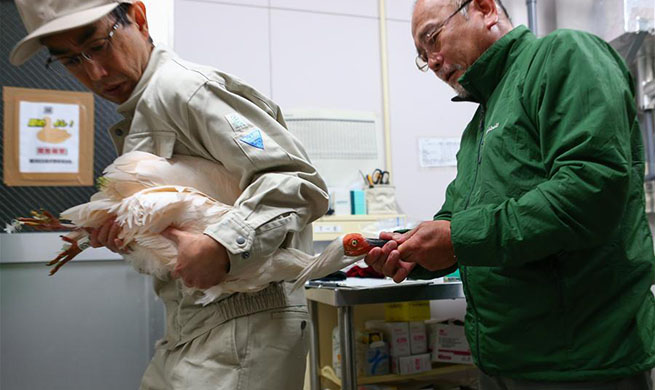WASHINGTON, Oct. 17 (Xinhua) -- American scientists identified a potential new smoking quit treatment in rodents, according to a study published on Wednesday in the journal Science Advances.
Researchers at Scripps Research gave nicotine-dependent rats an engineered enzyme that broke down nicotine in the bloodstream before it can reach the brain.
Treatment quickly reduced the animals' motivation to take nicotine, reversed their signs of nicotine dependence, and kept them from relapsing when they were given access to nicotine again, according to the study.
"This is a very exciting approach because it can reduce nicotine dependence without inducing cravings and other severe withdrawal symptoms, and it works in the bloodstream, not the brain, so its side effects should be minimal," said the principal investigator Olivier George, associate professor at Scripps Research, a nonprofit American medical research facility in San Diego.
Researchers estimate that about 60 percent of the people who try cigarettes end up as daily smokers, and about 75 percent of daily smokers relapse after quitting, due to nicotine dependence.
The enzyme called NicA2-J1 is an engineered version of a natural enzyme produced by the bacterium Pseudomonas putida. Scientists modified it to optimize its potency, its staying time in the blood, and other pharmacological properties.
In the new study, lab rats spent 21 hours every day, for 12 days, in a chamber where they could press a lever to give themselves an intravenous infusion of nicotine. In this way they learned to self-administer nicotine, and became dependent on it.
After the 12 days they were given access to nicotine only every 48 hours, which led them to experience withdrawal symptoms between access periods, and therefore to escalate their intake, a classic sign of deepening addiction.
Rats treated with the highest dose of NicA2-J1 (10 mg/kg) continued to self-administer nicotine when they could, but showed very low blood levels of the molecule compared to controls that did not receive the enzyme, according to the study.
Also, signs of nicotine withdrawal, such as susceptibility to pain and aggressive behaviors, were correspondingly reduced during the no-access periods, compared to untreated controls.
Now, the Scripps Research team hopes to take the new enzyme into clinical trials in humans.

















